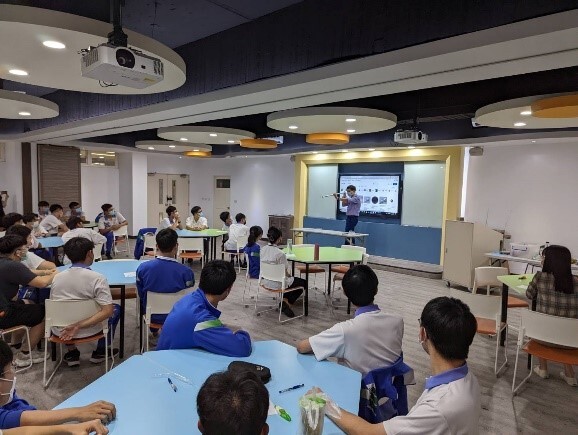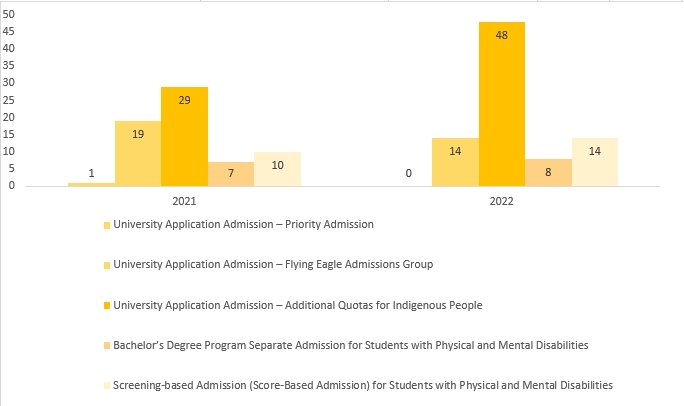SDG 1.3.1 Bottom financial quintile admission target
To eliminate all forms of poverty, ensure the rights and interests of the poor and disadvantaged groups to be educated, and implement social protection measures, NCUE takes the following measures to assist domestic low-income students or other students who meet stricter standards:
1. NCUE has implemented the Higher Education Sprout Project and the The Soaring Eagles Project (aid for economically disadvantaged students) to help disadvantaged students receive a university education.
With the momentum of the Higher Education Sprout Project, NCUE students come from diverse backgrounds. NCUE encourages its departments to actively provide enrollment quotas for disadvantaged students, waives their registration fees, provides transportation and accommodation subsidies for individual applicants, and holds seminars at high schools and vocational high schools. In 2022, NCUE started offering the Caring for Regional High Schools and Vocational High Schools micro-course activity to attract more students from families in Taiwan’s lowest 20% income group to study in NCUE (Figure 1). As of the end of June 2022, there were 402 students from families in the lowest 20% income group (low-income, middle-to-low-income, and disadvantaged levels 1-5) studying at NCUE, accounting for 5.6% of all students.
|
|
|
Figure 1. The Affiliated Industrial Vocational High School of NCUE employs interactive gaming methods to enhance students’ understanding of the course content. |
2. NCUE has introduced a variety of admission pathways for disadvantaged students and a better enrolling and learning mechanism to increase social mobility.
NCUE is committed to providing opportunities for disadvantaged students (indigenous peoples, students with physical or mental disabilities, and economically disadvantaged students) to enroll. NCUE encourages its departments to allocate additional admission quotas through various channels and has devised a comprehensive set of educational, learning, and counseling mechanisms to enable students to unleash their full potential while studying at NCUE. The goal is to progressively increase the number of economically disadvantaged students enrolled each year. The details of the relevant admission measures are as follows:
(1)Priority Admission (Please refer to Annex 1.3.1A): In the 2018/2019 academic year, NCUE introduced a “Priority Admission” mechanism in the university application process, which lowers admission criteria and increases the chances of admission for economically disadvantaged students. Applicable Departments: Department of Mathematics, Department of Physics (Physics Group), Department of Physics (Optoelectronics Group), Department of Biology, Department of English, Department of Electronic Engineering, Department of Fine Arts, etc.
(2)The Soaring Eagles Admission Groups (Please refer to Annex 1.3.1A): In the 2019/2020 academic year, NCUE established the “The Soaring Eagles Admission Groups”. Some departments allocate a certain number of admission quotas to each group, allowing for adjustments in the General Scholastic Ability Test standards and exempting some applicants who passed written document reviews from interviews. The goal is to enhance the opportunities for economically disadvantaged students to enroll in our university.
(3)Additional admission quotas for indigenous peoples (Please refer to Annex 1.3.1A): Enrollment quotas are determined based on the principle of adding two percent to the admission quotas approved by the Ministry of Education for each college, institute, department, and degree program. The admission methods include written exams, interviews, written document reviews, skill tests, or implementations.
(4)Separate Admission for Students with Physical or Mental Disabilities (Please refer to Annex 1.3.1B): Each department can separately allocate admission quotas up to ten percent of the department’s annual approved admission quotas. Admission methods may include written document reviews, interviews, skill tests, etc, at the discretion of each department. However, departments are encouraged to minimize the use of written exams.
In 2022, NCUE’s departments provided 129 admission quotas for disadvantaged students (low-income households, middle-to-low-income households, students in hardship, indigenous people, and students with physical and mental disabilities). 84 students were admitted. The related admission results are presented in Table 1 and Figure 2 below.
Table 1. Overview of 2022 Admission Results
|
Admission Name |
Number of Admissions |
|
2022 University Application Admission – Priority Admission (Economically disadvantaged students) |
0 1 admitted through regular admission, no need for priority admission mechanism |
|
2022 University Application Admission – The Soaring Eagles Admissions Group (Economically disadvantaged students) |
14 |
|
2022 University Application Admission – Additional Quotas for Indigenous People |
48 |
|
2022 Bachelor’s Degree Program Separate Admission for Students with Physical and Mental Disabilities |
8 |
|
2022 Screening-based Admission (Score-Based Admission) for Students with Physical and Mental Disabilities |
14 |
|
|
|
Figure 2. Overview of 2021-2022 Disadvantaged Student Admissions |


